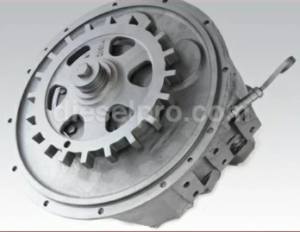March 12, 2025
Symptoms Indicating Rebuild Requirements 1. Persistent Fluid Leaks 2. Difficulty Shifting Gears 3. Frequent Slippage 4. Overheating During Normal Operation 5. Unusual Noises 6. Metal Shavings in Fluid Required Tools and Setup 1. Basic Tools 2. Specialized Tools 3. Safety Equipment 4. Workspace Setup Component Disassembly Overview 1. Prepare the Transmission for Disassembly 2. Remove External Components 3. Disassemble Major Components Gears and Bearings: Seals and Gaskets: 4. Organize and Label Parts Parts Inspection and Replacement Guidelines 1. Clutch Components 2. Bearings and Bushings 3. Gears and Shafts 4. Seals and Gaskets 5. Fasteners and Bolts Reassembly Procedures Correct reassembly is essential to restore the MG506 to optimal working condition. 1. Clean Components 2. Install Bearings and Gears 3. Assemble Clutch Components 4. Install Seals and Gaskets 5. Reconnect External Components Post-Rebuild Testing and Adjustments Testing the MG506 after reassembly ensures it performs reliably before being returned to service. 1. Initial Testing 2. Operational Testing 3. Make Final Adjustments 4. Long-Term Monitoring Conclusion A thorough rebuild of the Twin Disc MG506 Marine Gear restores its functionality and extends its lifespan. By following detailed disassembly, inspection, replacement, and reassembly procedures, operators can ensure the transmission returns to peak performance. Proper post-rebuild testing confirms that the overhaul is successful, reducing the risk of failure during critical operations. Read More
March 12, 2025
Regular Maintenance Schedule Daily Maintenance (Pre-Operation Checks) Weekly Maintenance Monthly Maintenance Quarterly Maintenance Annual Maintenance Lubrication and Fluid Change Intervals Recommended Fluid Type Fluid Change Intervals How to Perform a Fluid Change Inspection of Key Components (Filters, Seals, Clutches) 1. Filters 2. Seals 3. Clutches Troubleshooting Common Issues (Noise, Vibration, Slippage) 1. Noise 2. Vibration 3. Slippage How to Address Minor Leaks or Adjustments 1. Minor Leaks 2. Adjustments Long-Term Storage Guidelines 1. Drain Fluid 2. Clean and Dry Components 3. Apply Protective Coatings 4. Seal the System 5. Store in a Controlled Environment Troubleshooting and Diagnostics for Twin Disc MG506 Marine Gear Identifying Common Problems with Twin Disc MG506 Marine Gear 1. Unusual Noises 2. Vibration Issues 3. Fluid Leaks 4. Gear Slippage 5. Difficulty in Shifting 6. Overheating Step-by-Step Diagnostic Procedures Step 1: Conduct a Visual Inspection Step 2: Verify Fluid Levels and Quality Step 3: Test Operating Conditions Step 4: Check Mechanical Alignment Step 5: Review Error Codes (if applicable) Corrective Actions for Common Failures 1. Resolving Fluid Leaks 2. Addressing Vibration Issues 3. Correcting Gear Slippage 4. Fixing Difficult Shifting 5. Managing Overheating Issues When to Seek Professional Assistance 1. Persistent Noise or Vibration 2. Major Fluid Loss 3. Recurring Gear Slippage 4. Overheating Despite Repairs 5. Complex Electronic Issues Conclusion Read More
March 12, 2025
Regular Maintenance Schedule Daily Maintenance (Pre-Operation Checks) Weekly Maintenance Monthly Maintenance Quarterly Maintenance Annual Maintenance Lubrication and Fluid Change Intervals Recommended Fluid Type Fluid Change Intervals How to Perform a Fluid Change Inspection of Key Components (Filters, Seals, Clutches) 1. Filters 2. Seals 3. Clutches Troubleshooting Common Issues (Noise, Vibration, Slippage) 1. Noise 2. Vibration 3. Slippage How to Address Minor Leaks or Adjustments 1. Minor Leaks 2. Adjustments Long-Term Storage Guidelines 1. Drain Fluid 2. Clean and Dry Components 3. Apply Protective Coatings 4. Seal the System 5. Store in a Controlled Environment Read More
March 12, 2025
Starting Procedures for Twin Disc MG506 Marine Gear 1. Pre-Start Inspection 2. Warm-Up Process Shifting Instructions (Forward, Neutral, Reverse) 1. Shifting into Forward Gear 2. Shifting into Reverse Gear 3. Shifting into Neutral 4. Common Shifting Mistakes to Avoid Normal Operating Practices 1. Maintain Safe Operating Temperatures 2. Maintain Proper Fluid Levels 3. Avoid Excessive Idling in Gear 4. Regularly Check for Leaks and Noises 5. Use Smooth Throttle Inputs 6. Prevent Overloading Monitoring and Adjustments During Operation 1. Monitor Temperature and Pressure Gauges 2. Perform Visual Inspections 3. Conduct Mid-Operation Fluid Checks 4. Make Minor Adjustments as Needed Shutdown Procedures for Twin Disc MG506 Marine Gear 2. Shift into Neutral 3. Monitor Gauges During Cool-Down 4. Turn Off the Engine 5. Conduct a Post-Operation Inspection 6. Record Operating Data Conclusion Read More
March 12, 2025
Pre-Installation Checklist 1. Review Installation Manual 2. Inspect Components 3. Verify Alignment Compatibility 4. Check Mounting Structure 5. Gather Required Materials Tools and Equipment Required Standard Tools Specialized Tools Safety Equipment Consumable Supplies Mounting Procedures 1. Prepare the Mounting Surface 2. Position the Transmission 3. Secure Mounting Bolts 4. Check for Vibration Isolation Alignment Guidelines 1. Check Initial Alignment 2. Conduct Parallel Alignment 3. Conduct Angular Alignment 4. Final Torque of Mounting Bolts Fluid Connection Procedures 1. Install Oil Cooler (If Applicable) 2. Connect Fluid Lines 3. Fill Transmission with Lubricant 4. Bleed the System Final Inspection Before Initial Operation 1. Verify Mounting Security 2. Confirm Alignment 3. Inspect Fluid Levels 4. Test Electrical Connections 5. Check Safety Mechanisms 6. Perform Initial Startup Conclusion Read More
March 12, 2025
General Specifications for Twin Disc MG506 Marine Gear Weight Dimensions Mounting Considerations: Casing Material Mounting Type Technical Specifications for Twin Disc MG506 Marine Gear Torque Rating Power Rating Gear Ratios Cooling Type Fluid Capacity and Type for Twin Disc MG506 Marine Gear Fluid Capacity Recommended Fluid Types Fluid Change Intervals Signs of Fluid Deterioration Operating Parameters and Limits for Twin Disc MG506 Marine Gear Input Speed Range Temperature Limits Load Limits Pressure Limits Vibration and Noise Tolerance Emergency Shutdown Parameters Environmental Limits Read More




 Free US Calls: 1-888-433-4735
Free US Calls: 1-888-433-4735 International: 305-545-5588
International: 305-545-5588